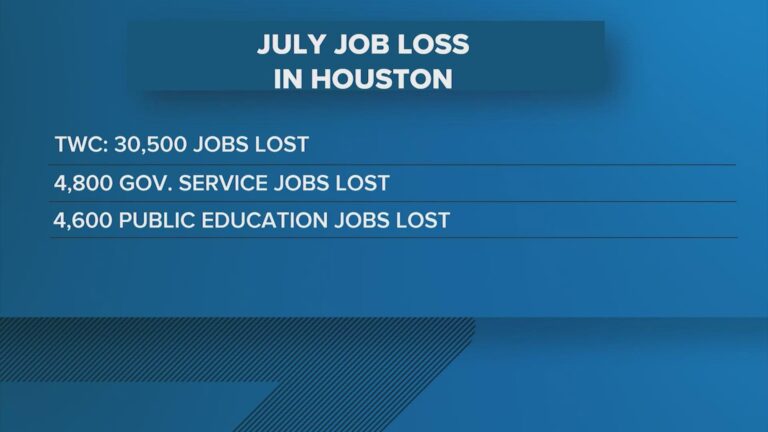HoustonтАЩs Economy Faces Major Job Losses Amid Sector-Wide Challenges
Widespread Job Cuts Shake HoustonтАЩs Core Industries
HoustonтАЩs employment landscape suffered a dramatic setback in April, with a staggering 30,500 positions eliminated across various sectors. This sharp contraction signals a troubling economic shift, affecting industries that have historically driven the cityтАЩs prosperity. The most impacted fields include:
- Energy Industry: Fluctuating global oil prices and cautious capital spending have forced energy firms, especially those involved in drilling and exploration, to implement significant layoffs.
- Manufacturing Sector: Disruptions in supply chains and a drop in new orders have compelled factories to reduce output or temporarily halt operations.
- Construction Field: Funding shortfalls and project cancellations amid economic uncertainty have led to a sharp decline in construction-related employment.
Experts emphasize the need for immediate and strategic action to prevent further erosion of HoustonтАЩs workforce. Below is a breakdown of job losses by industry for the past month:
| Industry | Jobs Lost | Percentage Decrease |
|---|---|---|
| Energy | 12,000 | 8.7% |
| Manufacturing | 9,500 | 7.3% |
| Construction | 6,000 | 6.0% |
| Other Sectors | 3,000 | 2.1% |
Decoding the Economic Drivers Behind HoustonтАЩs Job Decline
Economists link HoustonтАЩs unprecedented job losses to a mix of external economic pressures and evolving industry dynamics. The energy sector, a cornerstone of HoustonтАЩs economy, has been particularly vulnerable due to volatile crude oil prices and cautious investment strategies. Meanwhile, inflationary pressures and ongoing supply chain challenges have dampened consumer demand and business spending, especially in manufacturing and retail.
Key factors influencing the labor market downturn include:
- Corporate Restructuring: Companies facing uncertain economic conditions have prioritized workforce reductions to maintain financial stability.
- Technological Automation: The rise of automation has replaced many routine tasks, reducing the need for certain job roles.
- Trade Policy Adjustments: Recent shifts in trade regulations have negatively impacted export-reliant industries, curbing employment opportunities.
| Sector | Job Losses | Percentage Decline |
|---|---|---|
| Energy | 15,000 | 8% |
| Manufacturing | 8,500 | 5% |
| Retail | 6,000 | 4% |
Local Leaders Mobilize to Address Workforce Disruptions
Business and community leaders in Houston are raising alarms over the rapid job losses, highlighting a growing skills gap between available workers and employer needs. Many advocate for enhanced collaboration between educational institutions and industries to develop training programs that align with current market demands. Community groups are also stepping up, launching initiatives to reskill displaced employees and assist job seekers in navigating the evolving employment landscape.
Proposed solutions focus on innovative approaches to workforce stabilization and growth, including:
- Expanded Vocational Training: Programs aimed at equipping workers with skills in high-demand fields such as healthcare and information technology.
- Flexible Work Arrangements: Encouraging part-time, remote, and gig opportunities to broaden employment accessibility.
- Support for Small Enterprises: Financial aid and resources to help small businesses retain employees and sustain operations.
| Initiative | Focus Area | Anticipated Outcome |
|---|---|---|
| Workforce Skills Pipeline | Education & Training | Boost job readiness by 25% |
| Small Business Support Fund | Business Sustainability | Preserve over 5,000 jobs |
| Remote Work Promotion | Flexible Employment | Increase workforce participation |
Pathways to Economic Recovery and Workforce Resilience in Houston
In response to the employment crisis, HoustonтАЩs policymakers and business community are advancing targeted strategies to rejuvenate the job market and enhance economic durability. Focus is shifting toward sectors less affected by recent downturns, including healthcare, technology, and renewable energy. Collaborative efforts between public agencies and private enterprises are facilitating retraining programs that enable displaced workers to transition into emerging industries with promising growth prospects.
Key elements of HoustonтАЩs recovery blueprint include:
- Skill Enhancement Investments: Broadening access to vocational education and upskilling initiatives tailored to evolving industry requirements.
- Small Business Empowerment: Offering financial incentives and relief measures to stabilize and grow local enterprises.
- Infrastructure Development: Launching projects that create immediate employment while boosting long-term economic competitiveness.
- Diversification Efforts: Reducing dependence on the volatile energy sector by fostering innovation hubs and startup ecosystems.
| Sector | Recovery Focus | Projected Job Growth (Next 12 Months) |
|---|---|---|
| Healthcare | Telehealth & Community Services | 7% |
| Technology | Artificial Intelligence & Cybersecurity | 9% |
| Renewable Energy | Solar & Wind Energy Projects | 12% |
| Construction | Infrastructure Modernization | 5% |
Conclusion: Collaborative Efforts Essential for HoustonтАЩs Economic Revival
The abrupt elimination of 30,500 jobs in Houston within a single month highlights the significant economic hurdles confronting the city. As industries adjust to shifting market realities and external challenges, continuous monitoring and proactive strategies will be vital to stabilize employment and support affected workers. A united approach involving government bodies, businesses, and community organizations is crucial to tackling root causes and building a more resilient and diversified economic future for Houston.




